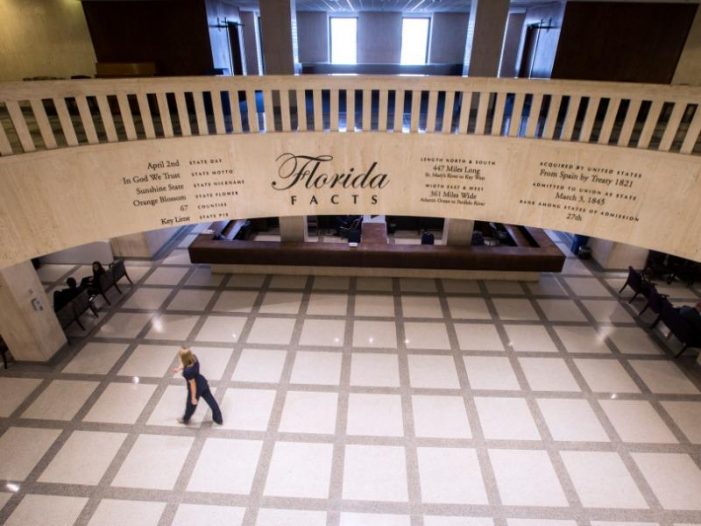By Jim Turner, The News Service of Florida
TALLAHASSEE — The House and Senate on Wednesday passed proposed budgets that are billions of dollars apart, giving them a little more than three weeks to mesh their spending goals and reach an agreement on tax cuts.
While the House has proposed cutting the state’s overall sales-tax rate, the Senate on Wednesday outlined a less-aggressive proposal that would provide a permanent sales-tax exemption on clothes and shoes costing $75 or less.
Senate President Ben Albritton, R-Wauchula, said he expects the House and Senate to “end up somewhere in the middle” on a budget. The legislative session is scheduled to end May 2, with the state’s new fiscal year starting July 1.
“We’re going in the right direction. We’re communicating well. We’re working together,” Albritton said after a Senate floor session. “And I have every expectation we’ll get the plane landed.”
Later, House Speaker Daniel Perez, R-Miami, said he expects lawmakers will reach budget agreements on time, while also saying “we believe in our budget.”
The Senate budget proposal (SB 2500) totals $117.36 billion. The House proposal (HB 5001) has a bottom line of $112.95 billion and is linked to a $5.4 billion tax package (HB 7031) that includes reducing the overall state sales-tax rate from 6 percent to 5.25 percent.
Gov. Ron DeSantis has said he wants a one-time property tax break for homesteaded properties and to ask voters in 2026 to pass a constitutional amendment to reduce or eliminate property taxes.
He also has requested the elimination over two years of a sales tax on commercial leases and sales-tax “holidays” on school supplies, recreational items, hurricane supplies, ammunition and firearms.
Echoing DeSantis, Rep. Mike Caruso, R-Delray Beach, said no one is “clamoring” for the House sales-tax cut, which he said would only provide “minimum immediate relief” while inadvertently benefitting “out-of-state visitors and tourists.”
“I’d rather see the money go to real Floridians, the ones that call this state home,” Caruso said before joining a unanimous vote in support of the House tax proposal.
House Ways & Means Chairman Wyman Duggan, R-Jacksonville, noted that DeSantis didn’t recommend the one-time property tax cut until after the House “rolled out the sales tax relief.”
The House tax package also would reduce the commercial-lease tax from 2 percent to 1.25 percent, cut the sales-tax rate on electricity from 4.35 percent to 3.6 percent, reduce the tax rate on sales of new mobile homes from 3 percent to 2.25 percent and trim the rate on coin-operated amusement machines, such as pinball machines, from 4 percent to 3.25 percent.
Albritton has cautioned against making cuts that lawmakers might have to readdress within a couple of years. On Wednesday, he pitched the proposed sales-tax elimination on clothes and shoes as being “where it can help the most number of Floridians.”
The Senate proposal also would direct the Legislature’s Office of Economic and Demographic Research to study the effects of reducing or eliminating property taxes for homesteaded properties.
Among other things, it would lead to holding a “back-to-school” tax holiday in August; a tax holiday on disaster-preparedness supplies in June; a tax holiday on recreational items in July; a tax holiday on tools around Labor Day; and a “hunting season” tax holiday in September and October on guns, ammo and other hunting supplies.
The estimated $750 million package is expected to go to the Senate Finance and Tax Committee on Tuesday.
The House and Senate budget proposals are below the $117.46 billion budget lawmakers passed last year before it faced DeSantis vetoes, mid-year adjustments and veto overrides.
Senate Appropriations Chairman Ed Hooper, R-Clearwater, described the goal as “right-sizing” state spending.
The House voted 98-6 to approve its proposed budget, which includes cuts in spending on agencies and programs. Rep. Felicia Robinson, D-Miami Gardens, said the House should invest in programs that promote growth, as reducing services at a time the state has strong reserves will “lead to job losses, reduced public services and a less stable economy.”
“I understand us trying to be conservative, but doing anything to the extreme can be detrimental,” Robinson said.
The House and Senate agree on some issues, such as continuing to spend $80 million next year on the tourist-marketing agency Visit Florida. But they differ in other areas, such as the Senate proposing to spend $750 million for Everglades restoration and the House proposing $357 million.
“Over the last 10 years the Legislature has appropriated nearly $4 billion for Everglades restoration. Of this amount, over $1.1 billion remains unspent, $900 million from the last two fiscal years,” House Agriculture & Natural Resources Budget Chairwoman Rep. Tiffany Esposito, R-Fort Myers, said. “We believe it’s fiscally responsible to reduce our appropriation of funds until the dollars we’ve already appropriated have been spent.”
Seeking to help the state’s troubled citrus industry, the Senate would spend $200 million for research and to help packinghouses and growers, with $125 million included for new trees. The House has proposed $10 million to fight citrus canker disease, which has caused massive damage to the industry over the past two decades.

